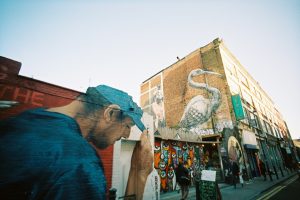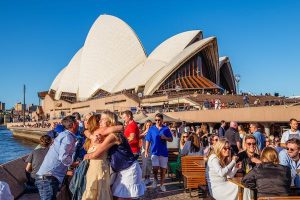
Take a journey with us to discover the cultural heritage, natural wonders and secret stories of islands both famous and far away.
Experience the canopy trees of Socotra Island, the penguin paradise of Macquarie Island, the Channel Islands’ dolphins and the colors of Hokkaidō.
We’ve compiled 15 of the most stunning and interesting islands featured in The Island Book, Lonely Planet’s new compilation of the world’s most amazing 150 islands. Whether relaxing on the beach, immersing yourself in the island’s culture or exploring the natural splendor of unspoiled terrain, these 15 islands will inspire your next great adventure.
The Americas
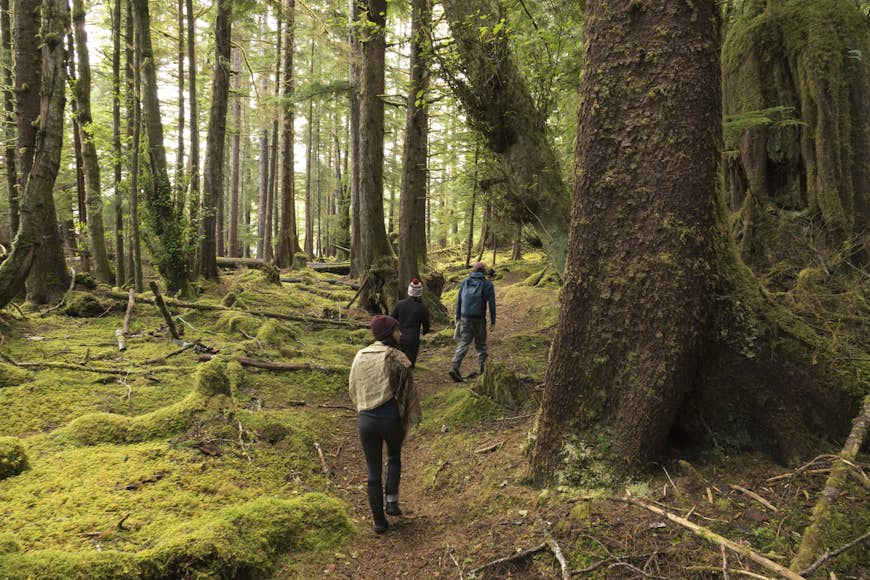 Hike inland on the islands of Haida Gwaii and you’ll find an incredible, lush world © Getty Images
Hike inland on the islands of Haida Gwaii and you’ll find an incredible, lush world © Getty Images
Haida Gwaii, Canada
Centuries-old totem poles reach toward the skies on the edge of misty rainforests, while the roar of crashing waves echoes through the treetops. Around 80km (50 miles) off the coast of British Columbia, the islands of Haida Gwaii showcase a world where nature rules supreme. Sudden thunderstorms and icy winds can’t blunt the power of seeing foraging black bears, nesting bald eagles and scurrying pine martens amid moss-laden forests that harbor some of the largest spruce and cedar on Earth. Haida Gwaii’s cultural treasures are equally inspiring. The Haida people have lived on their ancestral land for over 10,000 years, with historic villages and ancient archaeological sites attesting to their age-old presence. About 2500 Haida live on the islands, and they continue to contribute to a thriving arts and crafts scene while also playing a critical role in helping to protect the natural environment of the islands.
 Overlooking Scorpion Anchorage, on Santa Cruz Island, you’ll see the meaning of the ‘Galápagos of North America’ © Getty Images / iStockphoto
Overlooking Scorpion Anchorage, on Santa Cruz Island, you’ll see the meaning of the ‘Galápagos of North America’ © Getty Images / iStockphoto
Channel Islands, USA
Nicknamed the ‘Galápagos of North America’, Channel Islands National Park is home to an extraordinary variety of plant and animal life, including some 150 species found nowhere else on Earth. Volcanic activity formed the mountainous archipelago, which lies just off the coast of Southern California and was never attached to the mainland. While vestiges of human presence remain, including that of Chumash communities who lived on the island for more than 13,000 years, today these uninhabited islands offer a remarkable opportunity to reconnect with primeval wilderness. You can hike, kayak, scuba dive or camp amid a raw, edge-of-the-world landscape – or simply enjoy the unrivalled wildlife-watching amid the islands’ surprisingly diverse terrain.
The ultimate guide to California’s Channel Islands
Scout new ways to explore the planet’s wildest places with our weekly newsletter delivered to your inbox.  Find the poetry in the Muelle de las Almas (Dock of Souls) on Chiloé Island © Diego Grandi/Shutterstock
Find the poetry in the Muelle de las Almas (Dock of Souls) on Chiloé Island © Diego Grandi/Shutterstock
Chiloé Island, Chile
This peanut-shaped island off the coast of Patagonia, 1100km (683 miles) south of Santiago, lures foreigners with its moss-covered rainforests, historic churches and untrammeled beaches. Yet, if you ask a Chilean why they’re visiting, they’ll likely wax poetic over the culture, dialect and aesthetic, which are distinct from the mainland following centuries of historic isolation. The wooden stilt homes of Chiloé’s capital, Castro, are as colourful as the cast of characters in its local mythology, which includes fish-herding mermaids, sex-crazed forest goblins and lizards who predict the weather. Island meals, meanwhile, pair a rainbow of native potatoes with the fabulous fruits of the sea.
The best beaches in Chile for swimming, surfing and camping
Europe
 Head to Île de Ré for some laidback kite-surfing © Getty Images/iStockphoto
Head to Île de Ré for some laidback kite-surfing © Getty Images/iStockphoto
Île de Ré, France
The call of the wild harks back centuries on this chic Breton island, scattered with whitewashed villages in hues of aqua-green and eggshell blue. This might be the hobnobbing hotspot of weekending Parisians in summer, but the roots of tradition run deep in salt-of-the-earth Brittany: sauniers harvest sel from ancestral salt pans, farmers toil in family potato fields and new-gen artisans distil gin and vodka with homegrown fingerling potatoes and organic seaweed gathered along the shore. Grab a bicycle in the quaint fishing port of St-Martin-de-Ré and enjoy the ride!
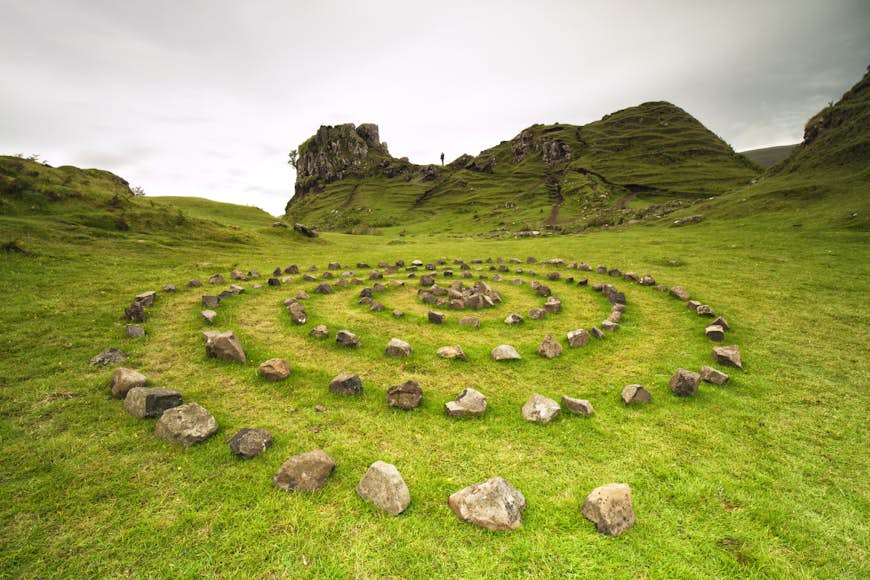 Be absolutely enchanted by a fairy glen on the Isle of Skye © Getty Images/iStockphoto
Be absolutely enchanted by a fairy glen on the Isle of Skye © Getty Images/iStockphoto
Isle Of Skye, Scotland
The second-largest of Scotland’s islands, in the Inner Hebrides, is its most spectacular, with a landscape that lurches from quiet coves and inky lochs to jagged pinnacles, tumbling waterfalls and pleated cliffs. Skye’s dramatic mountains and undulating moors are easily reached by a bridge from the mainland, but to access the remotest corners and most impressive views you’ll need to take to the high moorland on foot, cycle precipitous mountain roads or kayak along the puckered and indented coast. Temper it all with a visit to fairy-tale castles, colorful fishing villages and a host of museums, galleries and craft shops in the island’s lively towns. Bring a raincoat, though: the name Skye comes the old Norse sky-a, meaning ‘cloud island’. The weather here is unpredictable at best, but the scudding clouds and brooding skies only heighten the drama.
The ultimate guide to Scotland’s magical Hebrides islands
 The idyllic Vis Island is the remote vacation spot of your dreams – plus some bunkers © Getty Images / iStockphoto
The idyllic Vis Island is the remote vacation spot of your dreams – plus some bunkers © Getty Images / iStockphoto
Vis, Croatia
Cut off from the rest of the world from the 1950s until 1989, this former Yugoslav military base is bliss for island lovers seeking peace, tranquillity and untouched natural beauty in spades. Pristine forests, citrus groves, pebble beaches, clandestine nudist coves and dazzling sea caves evoke an island idyll of yesteryear – before tourism was born.
Incongruously, some of Vis’ most beautiful natural spots squirrel away rocket shelters, bunkers, weapon chests and submarine pens – abandoned by the Yugoslav National Army when it packed up camp and left the island in 1992. Remains of Greek and British naval cemeteries, Roman baths and an English fortress are further witness to this enigmatic island’s curious history.
Croatia’s best food and drink experiences
Africa
 The lush and enchanting coast of Cabo Verde could tempt any traveler © Getty Images/iStockphoto
The lush and enchanting coast of Cabo Verde could tempt any traveler © Getty Images/iStockphoto
Cabo Verde
Rising from the Atlantic 500km (311 miles) west of Senegal, this glorious island chain has a captivating blend of mountains, beaches and tranquil seaside villages. On Santo Antão, craggy peaks hide piercing green valleys of flowers and sugar cane, ideal for epic hikes. São Vicente is home to the cultural capital of the islands, Mindelo, which throbs with bars and music clubs. On Sal and Maio, undulating windswept dunes merge with indigo-blue seas on unspoiled beaches of powdery white sand. Meanwhile, far-flung Fogo and Brava in the southwest offer their own enchantments, from surreal volcanic landscapes to sparkling bays framed by towering peaks.
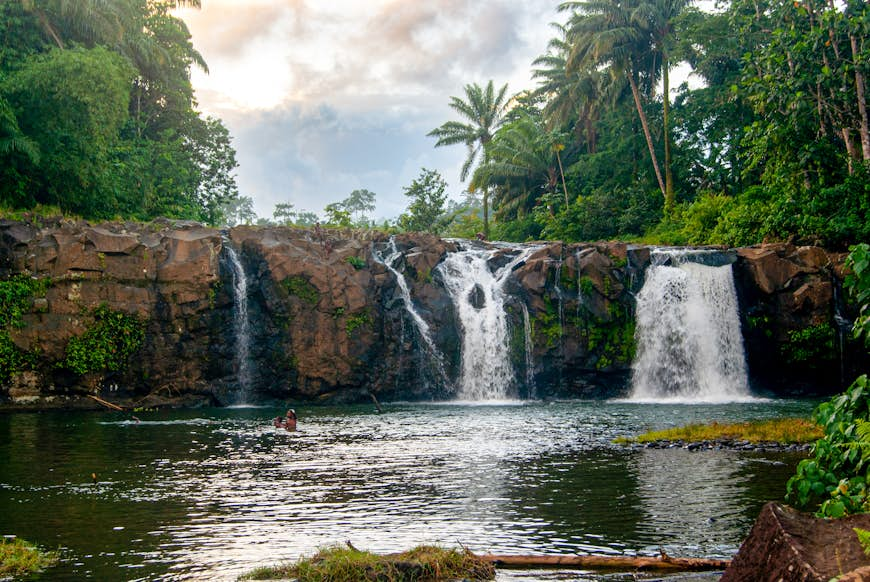 São Tomé & Príncipe provides plenty of natural wonders, like waterfalls © Getty Images/iStockphoto
São Tomé & Príncipe provides plenty of natural wonders, like waterfalls © Getty Images/iStockphoto
São Tomé & Príncipe
Adrift in the Gulf of Guinea, this two-island nation is Africa’s second-smallest and one that blends natural wonders with a gripping history. São Tomé & Príncipe (STP) is a safe and welcoming ecotourism destination, as rich in jungles as it is beautiful. This is especially true on unspoiled Príncipe, which has a population of just 7000. A canopy of green broken by spires of primordial rock, Príncipe is magnificent and wild, offering fantastic beaches, jungle exploration, snorkeling, fishing and birdwatching. A center of cacao production and with a promising economic future as an oil producer, it’s an island nation on the cusp of great change.
Île de Gorée: the perfect Dakar day trip
 The remote landscape of Socotra makes it home to incredible biodiversity © Csilla Zelko / 500px
The remote landscape of Socotra makes it home to incredible biodiversity © Csilla Zelko / 500px
Socotra, Yemen
Lying offshore from the Horn of Africa and the Arabian Peninsula, Socotra belongs politically to Yemen and is geographically a part of Africa. The island has been a Unesco World Heritage site since 2008, and its rugged, blistered interior shelters remarkable diversity: more than 700 of the island’s species (including one-third of Socotra’s plant species) are found nowhere else on Earth. Geographers consider Socotra to be one of the most isolated non-volcanic landforms on the planet, and its millions of years of isolation from other land masses is responsible for its famously biodiverse ecosystems.
How to make Ethiopian injera
Asia
 Children playing basketball in Malapascua Island, where settlements sit behind beachfront hotels © Getty Images
Children playing basketball in Malapascua Island, where settlements sit behind beachfront hotels © Getty Images
Malapascua Island, Philippines
Off the north coast of Cebu, this tiny tropical island is famous for its world-class diving. But even if you’ve no interest in marine life, Malapascua makes a brilliant beach destination, with more than a dozen pretty beaches and bays to discover. Curving around the southeastern corner of the island, beautiful Bounty Beach is lined with hotels and bars that buzz at sunset. Behind the beachfront hotels, shanty settlements are the legacy of Typhoon Yolanda, which tore off every roof on the island in 2013. Nearly a decade later, in December 2021, Malapasuca was lucky to escape a direct hit from Typhoon Odette, which decimated southern Cebu. As the only way to get here is by van or bus from Cebu City to the northern village of Maya (followed by a 45-minute ferry ride), visits to Malapascua play a role in the region’s typhoon recovery.
These eco-adventures are the best way to experience the Philippines
 Jeju Island shows off its volcanic origins, with natural pools where people can swim © Getty Images
Jeju Island shows off its volcanic origins, with natural pools where people can swim © Getty Images
Jeju-do, South Korea
Jeju-do, the largest island in South Korea, is presided over by Halla-san, the country’s tallest mountain at 1950m (6398ft) and the only shield volcano in Asia. The island’s volcanic origins are still evident today, in a number of impressive lava formations. At lower altitudes, Jeju-do has a humid subtropical climate, which has made it one of South Korea’s most popular tourist destinations; millions visit every year, and the island has earned the nickname ‘Honeymoon Island’. Jeju-do was an independent kingdom known as Tamna (Island Country) until the 10th century, when it became a protectorate of the Korean kingdom of Silla. Today it retains a modicum of autonomy as South Korea’s only self-governing province.
 Hokkaidō amazes with its colorful flower fields © Getty Images
Hokkaidō amazes with its colorful flower fields © Getty Images
Hokkaidō, Japan
Hokkaidō is Japan’s northernmost major island and also its second-largest, occupying one-fifth of the country’s land mass but home to fewer than 5% of its total population. Hokkaidō is the Japan of wide-open spaces, of big mountains and even bigger skies. To the east and south is the Pacific Ocean; to the west, the Sea of Japan; and to the north, the icy waters of the Sea of Okhotsk. In the center is Japan’s largest national park, Daisetsuzan – which means ‘Great Snowy Mountains’ – a largely untouched wilderness. In the language of Hokkaidō’s Indigenous people, the Ainu, Daisetsuzan is known as kamuy mintar, which means ‘the playground of the gods’. The Ainu have called the island home for centuries, long before Japanese settlers began arriving in earnest in the 19th century; Hokkaidō was officially annexed by Japan in 1869.
The 7 best national parks in Japan
Oceania
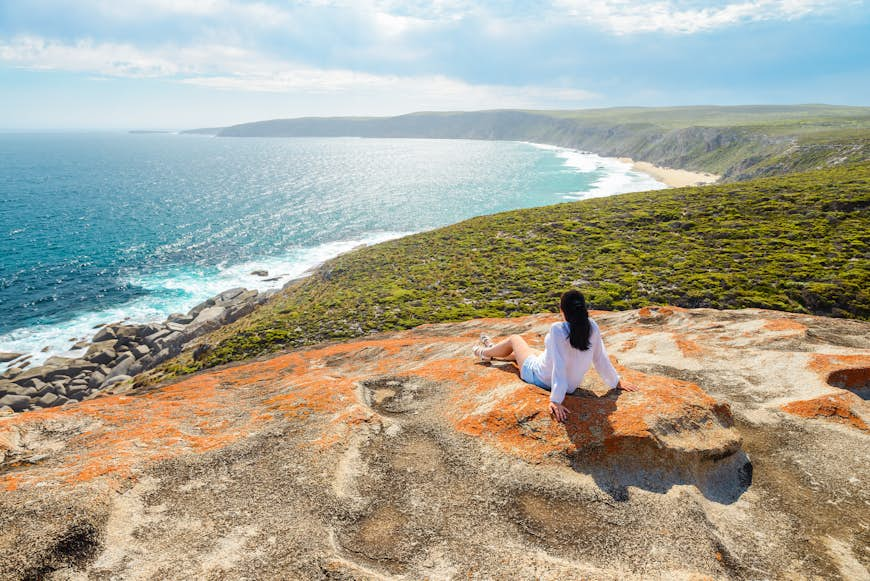 Sit back and enjoy the scenery at Remarkable Rocks, Kangaroo Island © Getty Images/iStockphoto
Sit back and enjoy the scenery at Remarkable Rocks, Kangaroo Island © Getty Images/iStockphoto
Kangaroo Island, Australia
Rising from the ashes after having been ravaged by fire in the Black Summer bushfires of 2019-20, when nearly half of the island burned, Kangaroo Island (or KI, as locals call it) remains a world-class wildlife and wilderness destination. The island, off the southern coast of South Australia, is home to iconic and charismatic native Australian animals on both land and sea. Add to that a delightfully slow pace of life – it’s the kind of place where children ride bikes to school and farmers advertise for wives on noticeboards – and a small but well-regarded winegrowing reputation, and it’s hard not to fall in love with KI.
Eating on Kangaroo Island: where to find the best feasts
 Admire the incredible penguins that call Macquiarie Island home © Getty Images/iStockphoto
Admire the incredible penguins that call Macquiarie Island home © Getty Images/iStockphoto
Macquarie Island, Australia
One of the Earth’s more remote islands, Macquarie is roughly halfway between Tasmania and Antarctica. Its leading attractions are its epic colonies of 100,000 seals (mainly elephant seals) and four million penguins, including about 850,000 breeding pairs of royals (which only raise young here and on the nearby Bishops and Clerks islands). That these huge colonies survive is remarkable: sealing (for skins) and penguin-hunting (for oil) historically wrought havoc upon seal and bird populations: after the discovery of then-uninhabited Macquarie in the early 19th century, the wildlife was pretty much wiped out by the dawn of the 20th century. Apart from the hunting, whalers and sealers upset the ecosystem by bringing horses, donkeys, dogs, cats, mice, rats, rabbits, goats, pigs, cattle, ducks, chickens and sheep to Macquarie. Rats, mice and rabbits remain numerous and problematic, but penguin and seal numbers rebounded following legal protections in the 1980s and beyond.
Top 15 beaches in Australia
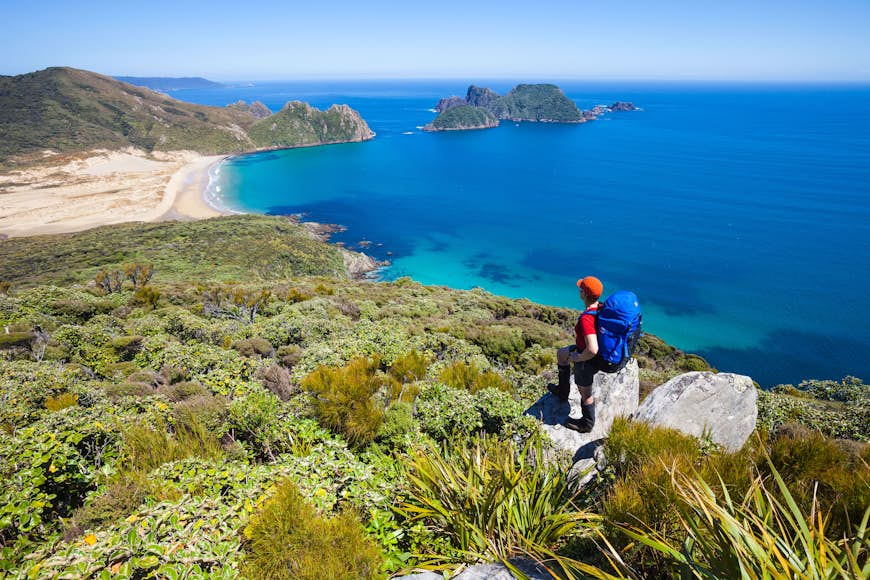 Hike across Rakuira and then admire the evening stars © Getty Images/iStockphoto
Hike across Rakuira and then admire the evening stars © Getty Images/iStockphoto
Stewart Island/Rakiura, New Zealand
Providing a southern anchor to New Zealand, Stewart Island is known in Māori as Rakiura – ‘Glowing Skies’ – in reference to the shimmering aurora australis (Southern Lights) phenomenon that is often sighted during the cooler and longer nights of a Southern Hemisphere winter. A small population of around 400 ensures Rakiura’s night skies remain largely pristine, and the island was awarded Dark Sky Sanctuary accreditation by the International Dark Sky Association in 2019. Beyond a concise and resourceful population living mainly around the Half Moon Bay settlement of Oban, both Stewart Island/Rakiura and neighboring Ulva Island teem with native New Zealand birdlife; many species are sighted by outdoor adventurers.

